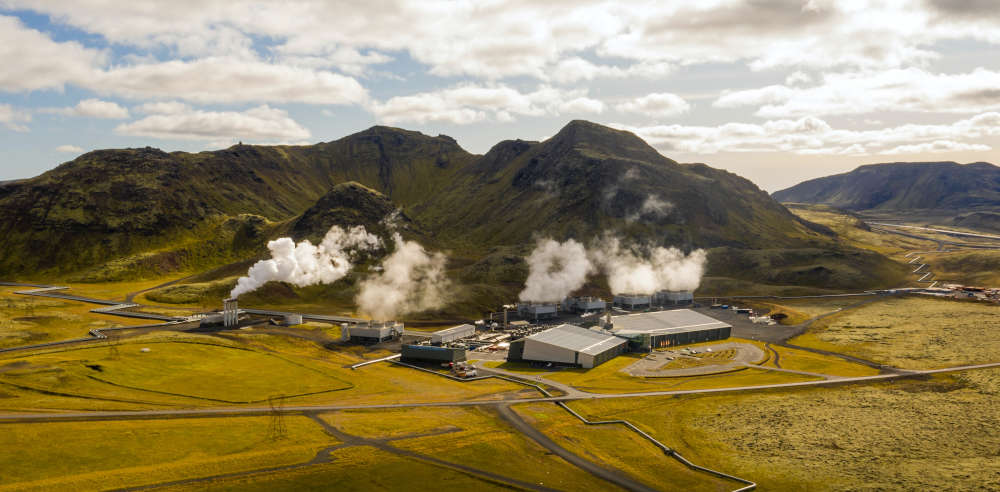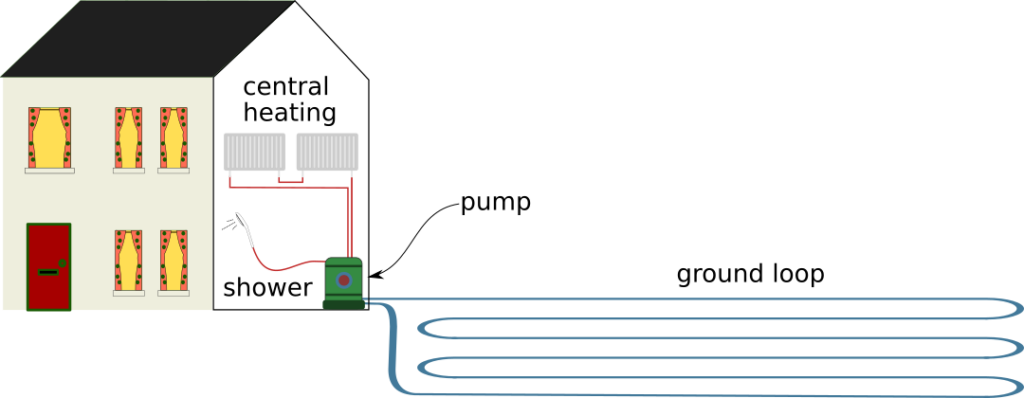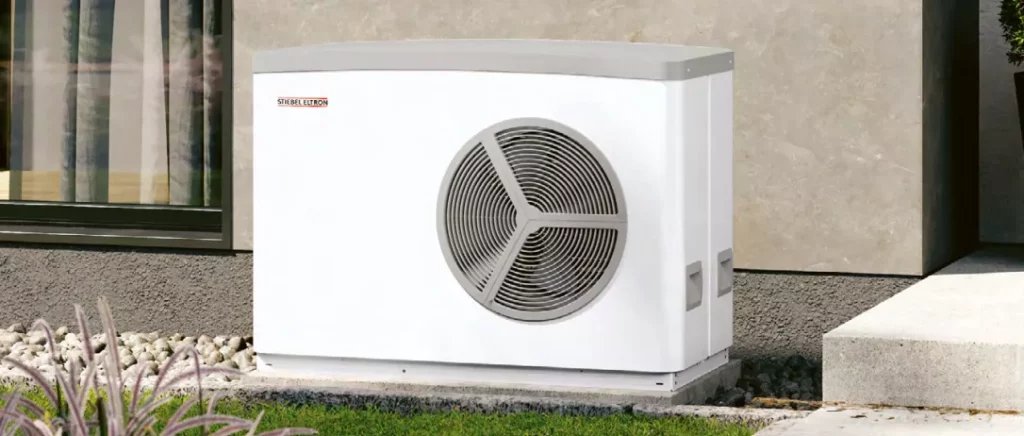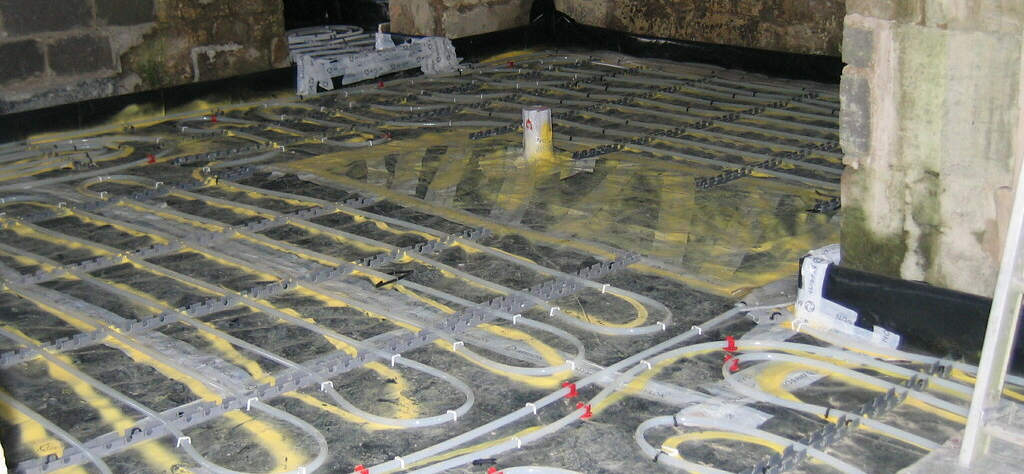Heat pumps that extract warmth from the Earth are classified as geothermal. Another name for this is ground-source. Conversely, heat pumps that extract warmth from outside air (air-source) are are not considered to be geothermal.
This article clears up the confusion between ground-source heat pumps, geothermal energy, and underfloor heating.
What is geothermal energy?
Geothermal energy means using the Earth’s heat as an energy source.
In some parts of the world, high temperatures can be found close to the surface. For example, volcanoes and geysers are both example of high temperatures from deep in the Earth bubbling to the surface.
Where high temperatures occur near the surface, energy can easily be harvested to generate electricity or warm homes.
But most countries don’t have convenient high geothermal temperatures near the surface…

What is a heat pump?
A heat pump is a special device that lets you extract heat from the ambient environment, even when you don’t have high temperatures available. For example, you can use a heat pump to extract 30 °C warmth from 0 °C outside air.
A heat pump that extracts warmth from air would not be considered geothermal… but a heat pump that extracts warmth from the ground would.
What is a geothermal (ground-source) heat pump?
A ground-source heat pump is a device that extracts warmth from the outdoor ground (not the air). This typically works with pipes laid in the ground at a depth of only 1 metre. On the other hand, some ground-source heat pumps use a system of much deeper boreholes. Still, warmth is extracted from the ground at a temperature of only 5-10 °C. The heat pump then boosts the heat to a usable temperature, typically 30-70 °C.
Ground-source heat pumps are popular because they can extract around 4 units of heat for every unit of electricity they use. This can make them cost-effective to run for both central heating and water for taps and showers. Plus, the Irish government are offering grants up to €6,500 for heat pumps. This is to save on energy imports and reduce carbon emissions.

How do I know if my heat pump is geothermal?
You can generally tell if your heat pump is geothermal buy a process of elimination. Specifically, if you don’t have a fan unit outside your house, then you haven’t got an air-source heat pump. Likewise, if you don’t live beside a body of water (lake or river) then your heat pump cannot be water-source. This leaves geothermal (ground-source) as the only possible technology for your heat pump.
It can also be possible to tell if a heat pump is geothermal by checking the boilerplate. This is a short page of information that’s attached to or printed on the side of the heat pump unit.

What is the difference between geothermal and ground-source heat pump?
A ground-source heat pump exploits geothermal energy using ambient-temperature soil. This means they can be installed in most locations. By contrast, geothermal power plants use deep high-temperature heat sources of volcanic heat in places including Iceland. So a ground-source heat pump is a special way to extract geothermal energy even in places where high temperature soil is not found naturally.
Geothermal systems and ground-source heat pumps in Ireland
Ground source heat pumps work great in Ireland, as the subsoil temperature here is a near-constant 10 °C. This is easily warm enough for a ground-source heat pump to extract warmth.
However, 10 °C is far from hot enough for a geothermal power plants. And to reach higher temperatures in Ireland requires very deep drilling. This makes geothermal energy power plants impractical here. Indeed, there are currently no true geothermal power plants or in Ireland.
What are two types of ground-source heat pump?
The two types of ground-source heat pump are horizontal loop and vertical loop. Ground-source heat pumps use a series of pipes to extract heat from the ground. Ground-source heat pumps with horizontal pipes around 1 m below the ground are called “horizontal loop”. Meanwhile, ground-source heat pumps with vertical pipes drilled deep into the Earth are called “vertical loop”.
The choice of horizontal loop versus vertical loop heat pump depends on the local geology.

Underfloor heating, heat pumps, and geothermal
Underfloor heating is a way to distribute heat from a heat source to your home. It involves a series of pipes, a few inches under your floor, that carry warm water. From the pipes, your floor, and thus your whole home are warmed. Underfloor heating is popular for a few reasons:
- A warm floor is great when you want to walk around in your bare feet
- A warm floor dries quickly after it’s washed
- Eliminating radiators saves space and helps with interior design
- Underfloor heating can be more energy efficient, especially when used with a heat pump
Underfloor heating itself is not the same thing as a heat pump – or geothermal. But they can work together – with a heat pump or geothermal source supplying the heat and underfloor heating distributing it to your home. On the other hand, underfloor heating works with just about any heat source – whether it’s electricity, oil, gas, or a heat pump.

Conclusion – is a heat pump geothermal?
Some but not all heat pumps are geothermal. You can tell if a heat pump is geothermal because it extracts warmth from the ground. This is why geothermal heat pumps are also called “ground-source” heat pumps. On the other hand, heat pumps that extra warmth from the air are not considered geothermal.